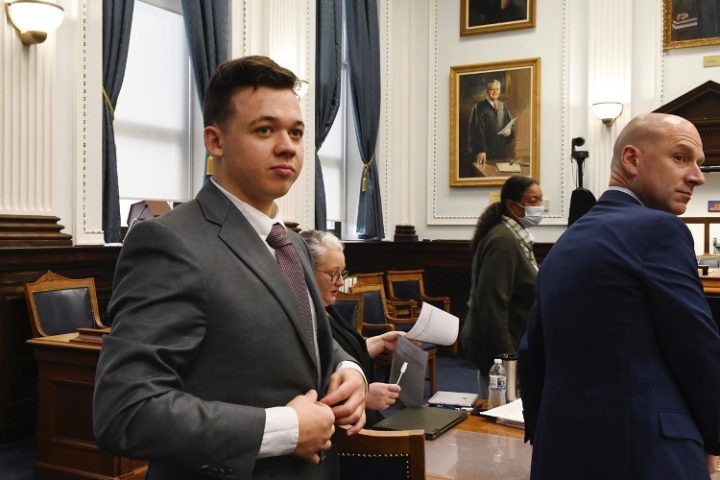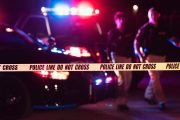
Jurors will hear about five hours of closing arguments today in the homicide trial of Kyle Rittenhouse, then decide whether he acted in self-defense the night last year when he shot three criminals during the Blake Riots in Kenosha, Wisconsin.
Video clearly shows that Rittenhouse shot the three in self-defense; all three had attacked or threatened him.
But prosecutors responding to public outrage, liberal law professor Jonathan Turley says, overcharged Rittenhouse and might well lose because of it.
Leftist media coverage and flat-out lies about Rittenhouse, including that he is a “racist” and “white supremacist,” largely created that outrage. Nonetheless, the state’s case is in danger.
Overcharging, Public Opinion
Rittenhouse’s ordeal began when he went into Kenosha during the riots. After cleaning graffiti at a public high school, and armed with an AR-15 semi-automatic rifle, Rittenhouse provided first aid to those injured during the arson and widespread property destruction, and also helped guard a car dealership from rioters.
Rittenhouse did nothing wrong. He attacked no one. But boy rapist and hardened ex-con Joseph Rosenbaum attacked Rittenhouse. That’s why Rittenhouse shot and killed him. After that, a mob chased down Rittenhouse and tried to kill him. Rittenhouse fired and missed the man who kicked him in the face; shot and killed convicted strangler Anthony Huber, who attacked him with a skateboard; then shot gun criminal Gaige Grosskreutz, who pointed a Glock .40-caliber semi-automatic handgun at the then 17-year-old.
Still, as Turley wrote for The Hill, prosecutors charged Rittenhouse as an adult with first-degree intentional homicide for killing Huber, first-degree reckless homicide for killing Rosenbaum, and first-degree attempted intentional homicide for shooting Grosskreutz. Prosecutors charged him with two counts of reckless endangerment for firing at the man who kicked him, and because witness Richard McGinnis was standing behind Rosenbaum.
This morning, Judge Bruce Schroeder dismissed the charge that Rittenhouse illegally possessed the rifle, a conviction that would have been appealable, Turley believes, because the statute is unclear.
“What is most striking about the trial is that, even more than a year later, prosecutors seem to be learning critical details at the same time as the jury,” Turley wrote:
A strikingly different image of the victims and shootings quickly emerged. There also were glaring prosecution blunders, including a potentially case-ending violation of a court order — and long-standing constitutional law — in using Rittenhouse’s post-arrest silence against him.
As The New American reported last week, the state’s own witnesses undermined its case.
“From the outset, Rosenbaum, 36, was portrayed as a menacing, violent actor,” Turley wrote. “A convicted child molester, he was described by various witnesses as threatening Rittenhouse and others and engaging in random violence.”
Jurors learned that the boy rapist “pushed a burning dumpster into a police cruiser with officers inside,” yet “prosecutors tried to rehabilitate him, with disastrous results.”
One of them was the testimony from Richard McGinnis, the Daily Caller reporter who saw Rittenhouse shoot Rosenbaum:
One prosecutor confronted McGinnis and declared, “You have no idea what Mr. Rosenbaum was thinking at any point of his life. You have never been inside his head. You never met him before.” McGinnis shrugged and said he “never exchanged words with him, if that’s what your question is.” The prosecutor then pressed further, saying McGinnis had no idea what Rosenbaum was thinking because it “is complete guesswork, isn’t it?” McGinnis dryly responded, “Well, he said, ‘F–k you’ and reached for [Rittenhouse’s] weapon.”
Witnesses described Rosenbaum as brandishing a chain and threatening to kill others.
Prosecutors then asked Rosenbaum’s girlfriend, Kariann Swart, if he had taken medication earlier on the day he was shot. That “opened the door” for the defense to ask Swart what the medication was for, and she revealed that Rosenbaum suffered from bipolar disorder and depression.
Then there was Grosskreutz. He testified that “Rittenhouse did not shoot him when he had his hands up after a confrontation. Instead, he admitted, Rittenhouse shot only after Grosskreutz pointed his own … handgun at Rittenhouse’s head.”
Grosskreutz also confessed that he did not have a permit for that weapon. As well, “the jury heard how Rittenhouse was chased as Huber struck him repeatedly with a skateboard and someone else hit him in the head with a rock.”
The prosecution’s medical witness suggested that Rosenbaum grabbed the barrel of Rittenhouse’s AR-15, Turley observed, and prosecution witness Nathan DeBruin testified that prosecutors asked him to change his statement to police.
“The trial of Kyle Rittenhouse increasingly seems like a legal version of the parable of the blind men and the elephant,” Turley wrote in USA Today last week:
By only touching discrete parts of the animal, the men describe vastly different animals. In coverage of this trial, one would think that there were parallel trials occurring in Kenosha, Wisconsin.
One consensus however is emerging: Things are not going well for the prosecution.
Big Disconnect
“For those watching the trial, there was a shocking disconnect from prior news coverage and the actual evidence,” Turley wrote for The Hill. “There was an even greater disconnect with the charges.”
Turley concluded that prosecutors in Kenosha made the same mistake as those who prosecuted George Zimmerman, who killed black hoodlum Trayvon Martin in self-defense.
“Some of us criticized prosecutor Angela Corey for pursuing first-degree murder in a classic self-defense case,” Turley explained, and with good reason:
With only Zimmerman surviving the encounter and exhibiting injuries from the struggle, a first-degree conviction was extremely unlikely as opposed to a manslaughter conviction — but the lesser charge would not have satisfied many in the public. The result was an acquittal.
Overcharging may please the public, but it can demolish a case. While jurors can convict on “lesser included” offenses, the credibility of the prosecution is established by the lead charge. Jurors tend to start at the top and work their way down on the charges. If the first-degree charge is wildly out of reach, they are more likely to doubt the lesser charges, too.
They promised the jury that it would see a vigilante rampaging in utter disregard of human life. Instead, the jury saw a much more confusing, chaotic scene in which Rittenhouse was threatened with a gun, hit repeatedly and chased down a street.
That does not bode well for a guilty verdict even if the jury considers lesser charges.



